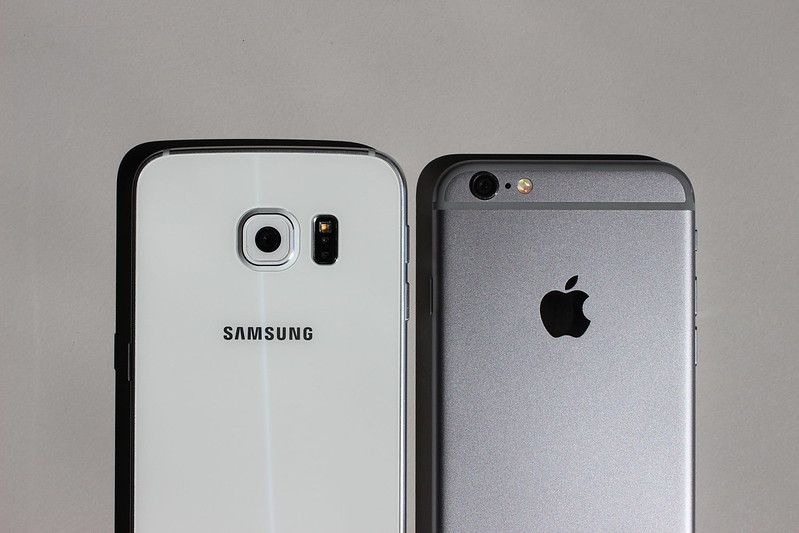The Shift in the Global Smartphone Market
The global smartphone market has had a significant shift with Samsung Electronics taking over the lead from Apple as the world's top smartphone provider once again in the first quarter of 2024. This change in ranking comes amidst a backdrop of decreasing shipments for both tech giants, although with varying degrees of impact. According to the International Data Corporation (IDC), while Samsung's shipments slightly dipped by 0.7% to 60.1 million units, Apple faced a sharper decline of 9.6%, resulting in 50.1 million units sold. This development has not only repositioned Samsung and Apple in the market but also highlighted the rising competition from Chinese smartphone manufacturers like Xiaomi and Transsion, who are securing an increasing market share.
The smartphone industry, however, is experiencing a broader revival, with global shipments rising by 7.8% year-over-year in the quarter. This growth suggests an escalating demand for smartphones, even as the market dynamics fluctuate. Among the reasons for these shifts are strategic pricing, technological advancements, and evolving consumer preferences, with a notable inclination towards higher-end models that users intend to keep for extended durations. As Apple and Samsung engage in this competitive landscape, their strategies and response to the changing consumer behavior will be crucial in maintaining their positions at the forefront of the industry.
The Dynamics Behind Samsung Surpassing Apple

Photo by BoliviaInteligente on Unsplash
Overview of Market Performance
In the first quarter of 2024, Samsung Electronics reclaimed the position as the world's top smartphone provider, a notable shift in the competitive landscape of the global smartphone market. According to International Data Corporation (IDC), Samsung led with shipments of 60.1 million units, despite a slight 0.7% decrease from the previous year. Apple, on the other hand, experienced a decline of 9.6% in its shipments, dropping to 50.1 million units. This change was amidst a broader context where the global smartphone market saw a 7.8% increase in shipments, reaching approximately 289.4 million units.
Factors Contributing to Samsung's Success
Several factors contributed to Samsung's ascent to the top spot. The release of its latest Galaxy S24 series ($859.99) played a significant role, driving sales with a compelling mix of innovation, design, and marketing. Samsung's broad product portfolio, catering to a wide range of consumer preferences and price points, also helped it maintain a competitive edge. Moreover, Samsung's strategic positioning in various global markets, particularly in developing regions, expanded its reach and bolstered its market share.
Apple's Challenges and Setbacks
For Apple, the first quarter marked challenges on multiple fronts. Sales in China, a crucial market for Apple, were particularly impacted by regulatory restrictions and escalating tensions between the U.S. and China. The restrictions on the use of Apple devices by Chinese government agencies and businesses further strained its performance. Additionally, intense competition from other Android phone makers, including rising stars from China like Xiaomi and Transsion, eroded Apple's market share. Apple's struggles were not just about market dynamics; broader economic factors and supply chain constraints also played a role in its decreased shipment volumes.
Impact on the Smartphone Industry

Photo by Dhruv vishwakarma on Unsplash
The Rise of Chinese Smartphone Brands
The shift in the smartphone market hierarchy underscores the rising influence of Chinese brands. Xiaomi and Transsion, in particular, saw gains in their market shares, capturing the third and fourth spots, respectively. These brands have successfully leveraged their deep understanding of local markets, aggressive pricing strategies, and rapid innovation cycles to expand their global footprints. Their growth reflects a broader trend of Chinese smartphone makers making significant inroads into international markets, challenging the dominance of established players like Apple and Samsung.
Global Smartphone Market Trends and Growth
The global smartphone market's resilience, despite a challenging economic landscape, points to the essential role these devices play in modern life. With a 7.8% year-over-year increase in shipments, the market's growth trajectory indicates healthy demand. One notable trend is the consumers' inclination towards more expensive devices, suggesting that users see value in investing in higher-quality smartphones that last longer. This shift towards premium segments poses implications for manufacturers, prompting them to innovate continually and offer compelling features to justify higher price points.
The Response from Apple and Future Strategies
Despite the setback in the first quarter, Apple is poised to respond aggressively. The company is reportedly doubling down on its investments in Artificial Intelligence (AI) and other cutting-edge technologies to differentiate its offerings. Anticipation is also building around Apple's annual Worldwide Developers Conference (WWDC), where it is expected to unveil significant updates, including the launch of iOS 18. Apple's strategic retail moves, like opening new stores in vital markets like China and offering discounts on its premium models in response to competitive pressures, signal its intent to reclaim lost ground and strengthen its market position.
Apple and Samsung's Competitiveness Going Forward

"USA-CHINA/" by f097653195021 is licensed under CC BY-SA 2.0.
Technological Innovations and Consumer Preferences
Technological innovation remains at the heart of the smartphone industry, driving both Samsung's and Apple's strategies to regain or maintain market leadership. Innovations in smartphone technology, such as advancements in artificial intelligence (AI), camera technology, battery life, and processing power, significantly influence consumer preferences and market share dynamics. For example, Apple's investment in AI and the introduction of AI-powered chips indicate a push towards more intelligent and efficient devices. Similarly, Samsung's success with the Galaxy S24 series demonstrates the impact of timely and appealing innovations on market share.
Consumer preferences have also evolved, with a noticeable trend towards high-quality, feature-rich smartphones. This trend is evident in the increasing average selling prices of smartphones, as consumers are willing to invest in more expensive devices with the expectation of a longer lifespan. Both Samsung and Apple will need to continue adapting to these preferences, focusing on premium device offerings and possibly exploring new features or services that can enhance user experience and device longevity.
Environmental Considerations and Sustainability Efforts
Environmental considerations are becoming increasingly crucial in the global smartphone market. Consumers and stakeholders are more aware of and concerned about the environmental impact of their purchases, including smartphones. This shift is pushing companies like Samsung and Apple to intensify their sustainability efforts, including more responsible sourcing of materials, improving energy efficiency of devices and operations, and enhancing recycling programs and trade-in options for older devices.
These sustainability efforts not only help to reduce the environmental impact but also serve as a differentiator in the market, potentially attracting consumers who prioritize eco-friendly products. Moreover, with regulatory pressures regarding sustainability expected to increase, the companies’ proactive measures in this area could mitigate risks and position them favorably in the eyes of environmentally conscious consumers.
Predictions for Future Market Leaders
Predicting future market leaders in the highly volatile smartphone industry is challenging, given the rapid pace of technological change and evolving consumer preferences. However, Samsung's recent overtaking of Apple to become the world's top smartphone provider signals a competitive landscape that remains fluid and contestable. Both companies possess the innovation capabilities, brand strength, and financial resources to continue competing at the highest level.
Further, the rise of Chinese smartphone manufacturers, like Xiaomi and Huawei, introduces additional competition, especially in markets like China and India, where these brands have been gaining significant market share. This suggests that while Samsung and Apple are likely to maintain their positions at the high end of the market, their overall dominance may be challenged by these emerging players, especially in developing markets.






